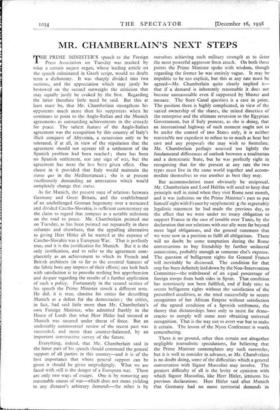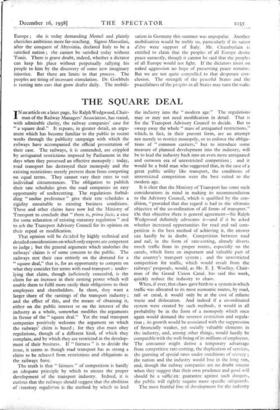MR. CHAMBERLAIN'S NEXT STEPS
THE PRIME MINISTER'S speech to the Foreign Press Association on Tuesday was marked by what a certain august organ, whose leading article on the speech culminated in Greek script, would no doubt term a dichotomy. It was sharply divided into two sections, and the appreciation which may justly be bestowed on the second outweighs the criticism that may equally justly be evoked by the first. Regarding the latter therefore little need be said. But this at least must be, that Mr. Chamberlain strengthens his opponents much more than his supporters when he continues to point to the Anglo-Italian and the Munich agreements as outstanding achievements in the crusade for peace. The salient feature of the Anglo-Italian agreement was the recognition by this country of Italy's illicit conquest of Abyssinia, a concession only to be tolerated, if at all, in view of the stipulation that the agreement should not operate till a settlement of the Spanish problem had been reached ; there has been no Spanish settlement, nor any sign of one, but the agreement has none the less been given effect. One clause in it provided that Italy would maintain the status quo in the Mediterranean ; she is at present vociferously demanding an annexation which would completely change that status.
As for Munich, the present state of relations between Germany and Great Britain, and the establishment of an unchallenged German hegemony over a truncated and divided Czecho-Slovakia, is sufficient commentary on the claim to regard that compact as a notable milestone on the road to peace. Mr. Chamberlain pointed out on Tuesday, as has been pointed out repeatedly in these columns and elsewhere, that the appalling alternative to giving Herr Hitler all he wanted at the expense of Czecho-Slovakia was a European War. That is perfectly true, and it is the justification for Munich. But it is the only justification, and to refer to the agreement com- placently as an achievement to which its French and British architects (in so far as the essential features of the fabric bore any impress of their efforts) can look back with satisfaction is to provoke nothing but apprehension and despair regarding the results of a further application of such a policy. Fortunately in the second section of his speech the Prime Minister struck a different note. He did, it is true, chastise his critics for describing Munich as a defeat for the democracies ; the critics, in fact, had said little more than Mr. Chamberlain's own Foreign Minister, who admitted frankly in the House of Lords that what Herr Hitler had secured at Munich was secured under threat of force. But an undeniably controversial review of the recent past was succeeded, and more than counter-balanced, by an important constructive survey of the future.
Everything, indeed, that Mr. Chamberlain said in the latter part of his speech should command the general support of all parties in this country—and it is of the first importance that where general support can be given it should be given ungrudgingly. What we are faced with still is the danger of a European war. There are only two ways of escape. One is by removing any reasonable causes of war—which does not mean yielding to any dictator's arbitrary demands—the other is by ourselves achieving such military strength as to deter the most powerful aggressor from attack. On both these points the Prime Minister spoke with wisdom, though regarding the former he was entirely vague. It may be impolitic to be too explicit, but this at any rate must be agreed—Mr. Chamberlain quite clearly implied it— that if a demand is inherently reasonable it does not become unreasonable even if supported by bluster and menace. The Suez Canal question is a case in point. The position there is highly complicated, in view of the varied ownership of the shares, the mixed direction of the enterprise and the ultimate reversion to the Egyptian Government, but if Italy protests, as she is doing, that an international highway of such moment ought not to be under the control of two States only, it is neither reasonable nor expedient to refuse to so much as hear her case and any proposals she may wish to formulate. Mr. Chamberlain perhaps assessed too lightly the fundamental differences of outlook between a totalitarian and a democratic State, but he was perfectly right in recognising that for the present at any rate the two types must live in the same world together and accom- modate themselves to one another as best they may.
But accommodation must obviously be reciprocal. Mr. Chamberlain and Lord Halifax will need to keep that principle well in mind when they visit Rome next month, and it was judicious on the Prime Minister's part to put himself right with France by supplementi: g the regrettably legalistic statement he had made the previous day, to the effect that we were under no treaty obligation to support France in the case of trouble over Tunis, by the declaration that our relations with our ally went far beyond mere legal obligations, and the general statement that we were now in a position to fulfil all obligations. There will no doubt be some temptation during the Rome conversations to buy friendship by further unilateral concessions, probably enough at someone else's expense. The question of belligerent rights for General Franco will inevitably be discussed. The condition for that step has been definitely laid down by the Non-Intervention Committee—the withdrawal of an equal percentage of foreign troops from both sides in Spain. That condition has notoriously not been fulfilled, and if Italy tries to secure belligerent rights without. the satisfaction of the prescribed condition, as she tried successfully to secure recognition of her African Empire without satisfaction of the agreed condition of a Spanish settlement, the theory that dictatorships have only to insist for demo- cracies to comply will come near obtaining universal recognition. That is the way not to avert war but to make it certain. The lesson of the Nyon Conference is worth remembering.
There is no ground, other than certain not altogether negligible journalistic speculations, for believing that the Prime M_inister contemplates any such surrender, but it is well to consider in advance, as Mr. Chamberlain is no doubt doing, some of the difficulties which a general conversation with Signor Mussolini may involve. The greatest difficulty of all is the levity or cynicism with which Signor Mussolini, like Herr Hitler, jettisons his previous declarations. Herr Hitler said after Munich that Germany had no more territorial demands in Europe ; she is today demanding Memel and plainly cherishes ambitions more far-reaching. Signor Mussolini, after the conquest of Abyssinia, declared Italy to be a satisfied nation ; she cannot be satisfied today without Tunis. There is grave doubt, indeed, whether a dictator can keep his place without perpetually rallying his people to him by the discovery of some new imaginary injustice. But there are limits to that process. The peoples are tiring of incessant stimulation. Dr. Goebbels is ranting into ears that grow deafer daily. The mobili- sation in Germany this summer was unpopular. Another mobilisation would be trebly so, particularly if its raison d'être were support of Italy. Mr. Chamberlain is entitled to claim that the peoples of all Europe desire peace earnestly, though it cannot be said that the peoples of all Europe would not fight. If the dictators insist on naked aggression no hope of preserving peace remains. But we are not quite compelled to that desperate con- clusion. The strength of the peaceful States and the peacefulness of the peoples in all States may turn the scale.















































 Previous page
Previous page